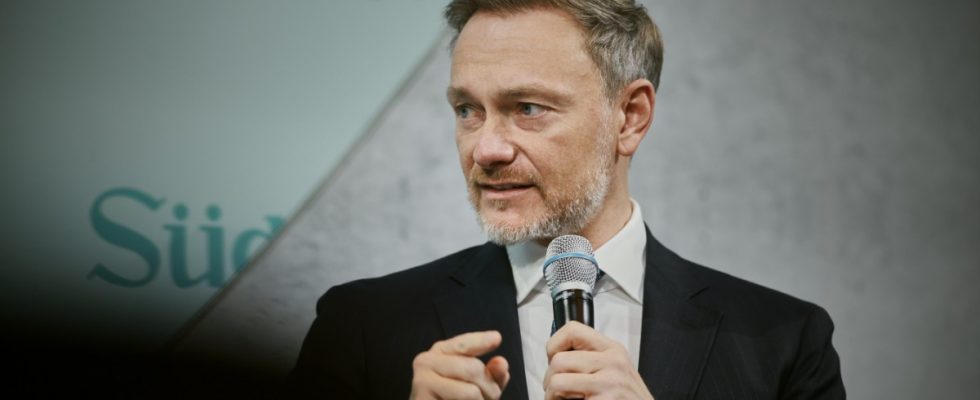When Christian Lindner arrived at the Hotel Adlon on Tuesday afternoon, he was asked to make a “gesture” during a quick photo shoot before his appearance. The FDP leader and Federal Finance Minister doesn’t have to think for long and folds his arms. “I don’t give anything,” he says and laughs.
This sets the tone. It’s about money, in Lindner’s appearance at the SZ economic summit and elsewhere. The minister reminds right at the beginning of the budget committee’s adjustment meeting, which is on the parliamentary calendar this Thursday. There was a hard fight over this very budget this year. So hard that Lindner had to change his scheduling several times because his cabinet colleagues refused to give up their resistance to his course for a long time.
He calls this course “moderate-restrictive” on Tuesday. The debt brake is not at issue and spending has been reduced, which is also an imperative to combat inflation. In any case, the minister believes that the trend reversal after the crisis budgets of the Corona period has been achieved. He points out that this year’s deficit of 2.5 percent will be lower than originally forecast, “mind you including all ancillary budgets and special funds.” According to the Council of Experts, the debt ratio will also fall to 64 percent next year. “We are approaching pre-crisis levels faster than expected.”
Of course, Lindner knows that his budget policy is more likely to be accepted than shared by parts of the traffic light. That’s another reason why he doesn’t want to leave the savings successes alone. Record investments are planned for the 2024 budget, he says, and the investment rate is increasing. And that is without the climate and transformation fund, with which the government wants to promote investments in climate protection and future technologies. In addition, there would also be his Growth Opportunities and Opportunity Financing Act to strengthen the weakening economy again.
Lindner can’t resist a few tips. Last week, the government agreed to relieve the economy of energy costs not through an industrial electricity price – a pet project of the Green Economics Minister Robert Habeck – but through a reduction in electricity taxes. Lindner sees this as a point for himself and his party. He sends a second greeting, at least in subtext, to the Greens: “We have to end a sport that has been practiced in Germany for a long time,” namely “being ever faster, ever more ambitious when it comes to exit dates.” His suggestion: “We should only allow ourselves to exit from whatever technology once the replacement, the thing we want to get into, has been finally clarified.”
Even if Lindner is of the opinion that the government has managed to “exit” from ever-increasing debts, he still sees certain deficits. From his point of view, the turnaround has not yet been successful in terms of the demands of others. He experienced this personally in the tough budget negotiations this year, when his colleagues expressed wishes for billions that astonished even experienced budget experts in his ministry. But Lindner is not just concerned with the wishes of his fellow ministers. “All demands and wishes are directed against the state budget,” he says. However, it will neither be possible to compensate for the general loss of purchasing power for citizens nor to fulfill all of the economy’s wishes, such as an industrial electricity price.
And: Times are not getting any easier, not even from a budgetary perspective. The federal government must begin repaying the Corona loans in 2028. In addition, the special fund for the Bundeswehr will then be used up, which is why the necessary defense spending for the NATO goal of two percent of gross domestic product will have to be covered from the normal core budget.
Nevertheless, Lindner was confident on Tuesday. His recipe: No additional structural spending, “simply no permanent structural budget burdens, then economic prosperity will provide us with the resources we need in 2028.” These prospects are unlikely to really inspire his coalition partners, but this clearly does not deter the minister. When asked about his desired coalition after the 2025 federal election, he simply said: “I don’t have a desired coalition.” The FDP is doing its job and the citizens will then make their decision in 2025. “And then we will accept this judgment and see what kind of governments can be formed for the period 2025 to 2029.”

